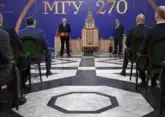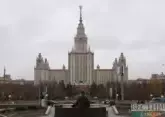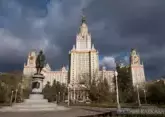This year, the positions of Russian universities in the world's top universities ranking QS World University Rankings have significantly improved. Regional Director of Eastern Europe & Central Asia of QS Ltd (UK), Zoya Zaitseva, said that for the first time since the release of the global rating in 2004, the Russian results are exceptionally positive: "We entered the the world's top five fastest-growing countries. Four countries that are ahead of us in terms of dynamics are the countries, where one or two universities have made a big leap ... Russia appears in press releases around the world. I do not know whether we will notice this in terms of submission of applications by students or interest from our colleagues abroad, but the fact that Russia will be recognized in international Russian releases will work in our favor."
Speaking about this year's rating, Zaitseva noted that five thousand universities were considered, and one thousand entered the final list. "There were 60 new entries in the global rating, of which three are Russian universities. This year, Eastern Europe has shown the highest results. Russia, Poland, Hungary, and other countries in the region are all working to increase their universities' participation, increase the representation of their universities in the global arena," the expert said.

According to academic polls and employee surveys, this year Russians mostly demonstrated progress as well. "168 Russian educational institutions were mentioned in employee surveys. 173 Russian educational institutions were mentioned at least once by academic experts. In comparison with the results of the past years, this is a serious growth, which works in favor of not just classical but also industrial universities. Rankings by subject and cooperation of our educational institutions affect the international recognition. Out of 27 Russian universities that entered the QS World University Rankings this year, 20 universities demonstrated growth, one university moved down the rank, while three universities held their positions. They were able to keep them, despite the large number of new occurrences of the world, in spite of the aggressive policy on the part of Indian and Asian universities," Zaitseva said.
Lomonosov Moscow State University is the 90th in the ranking. This is the best result since 2004. In addition, according to Zaitseva, "the most noticeable growth in the top-500 global ranking from Russia's ones was shown by the Peoples' Friendship University of Russia, by rising from the 501-600 group to the 446 position. The Samara University made it to the 701-750 group from the 801+ group. The Tomsk State University year showed the best dynamics since 2012, by moving up 323 ranks to the 277th place."

Director of the Department for Government Policy in Higher Education of the Russian Ministry of Education and Science Alexander Sobolev believes that the achieved heights are the result of systematic work of Russian state universities over the past 10-15 years. "There is a certain pool of world-class universities in Russia. Out of 27 universities included in the ranking, 17 are universities from the Project 5-100, and 10 are universities that are not part of this project. They are moving projects of innovative universities, federal, national, research ones - Bauman Moscow State Technical University, MGIMO, engineering and humanitarian universities, Southern Federal University, which recently had no means of state support and works within the entrepreneurial university model, Saratov University, Plekhanov University."
Project 5-100 is a state program to develop major Russian universities, launched by the Ministry of Education in accordance with the decree of Vladimir Putin on May 7, 2012 "On measures for the implementation of state policy in the education and science field." The project aims to improve the prestige of Russian higher education and bring at least five universities from among the project participants into the hundred best universities in the world according to the three most authoritative world rankings: Quacquarelli Symonds, Times Higher Education or Academic Ranking of World Universities.
Sobolev believes that world-class universities are distinguished by research work and a deliberate strategy, a clear focus on the tasks that universities want to solve. In his opinion, there are four directions, which activities lead to such impressive results: "Research, internationalization, openness of universities, application of modern education technology. Everything that is related to participation in global projects: reputation, graduates, career tracks. It is built into the whole system of interaction with regional, national and transnational communities."
According to the director of the Department for Government Policy in Higher Education, Russia's leading universities have a modern scientific infrastructure: "There are three thousand laboratories only within the Project 5-100, of which about one thousand are headed by leading Russian and foreign scientists with good international programs. This is evidenced by a citation rate. We have monitored the increase and quality of publications on the results of our monitoring and scientific monitoring. The growth is very high. Over the past two years, the number of publications increased 1.3 times, and the citation rate increased significantly as well. That is, the dynamics of Russian universities is increasingly improving."
Sobolev asserts that leading universities have learned to work in international networks: "There are joint educational programs, an international collaboration, which increases the attractiveness of our universities for foreign students and foreign teachers. The international appeal of our universities is becoming a critical factor in their success."











